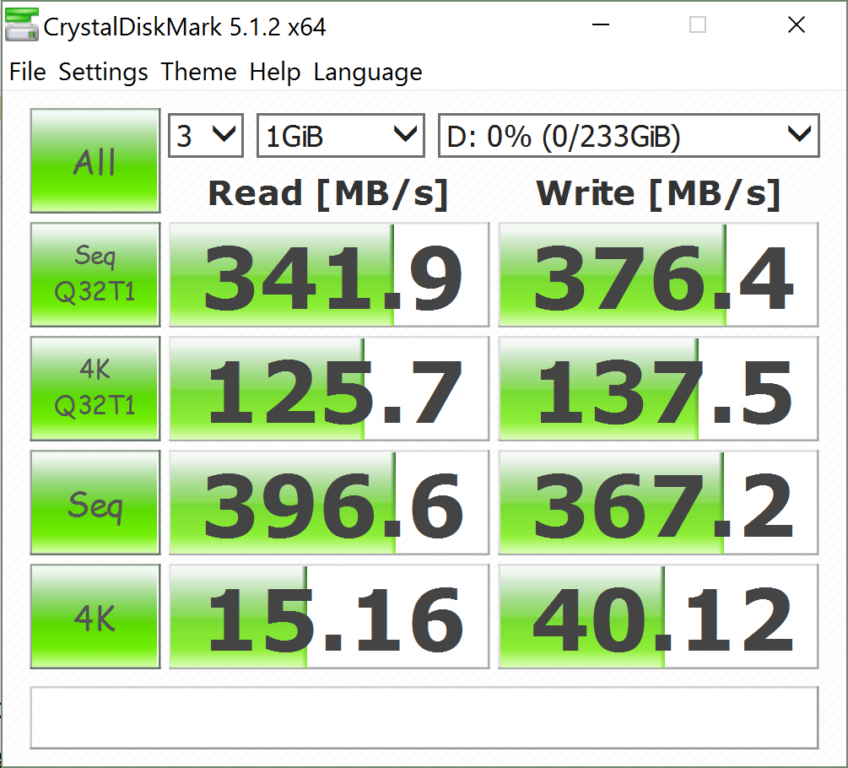CRYSTAL DISK BENCHMARK VER. 5.0 X64
Crystal Disk Benchmark is used to measure read and write performance through sampling of random data which is, for the most part, incompressible. Performance is virtually identical, regardless of data sample so we have included only that using random data samples.
Crystal DiskMark produced data speed transfer highs of 341MB/s read and 376MB/s, which again fell below listed specifications. Considering that this is an external SSD, we were impressed with the low 4K write performance, however.
The toughest benchmark available for solid state drives is AS SSD as it relies solely on incompressible data samples when testing performance. For the most part, AS SSD tests can be considered the ‘worst case scenario’ in obtaining data transfer speeds and many enthusiasts like AS SSD for their needs. Transfer speeds are displayed on the left with IOPS results on the right.

 The AS SSD results were refreshing with performance that we might expect from the ADATA SE 730, considering AS SSD puts the SSD through its paces. It validates our use of several different software benchmarks as the Crystal DiskMark result seems to be just a bit outside what we might consider normal.
The AS SSD results were refreshing with performance that we might expect from the ADATA SE 730, considering AS SSD puts the SSD through its paces. It validates our use of several different software benchmarks as the Crystal DiskMark result seems to be just a bit outside what we might consider normal.
ANVIL STORAGE UTILITIES PROFESSIONAL
Anvil’s Storage Utilities (ASU) are the most complete test bed available for the solid state drive today. The benchmark displays test results for, not only throughput but also, IOPS and Disk Access Times. Not only does it have a preset SSD benchmark, but also, it has included such things as endurance testing and threaded I/O read, write and mixed tests, all of which are very simple to understand and use in our benchmark testing.
As we can see, ATTO, AS SSD and Anvil Storage utilities all provide data storage performance just over 400MB/s, which is still a very good performance number in itself.
REPORT SUMMARY AND FINAL THOUGHTS
On receipt of the ADATA SE730 at our office, we were a bit confused in first learning that this external SSD is only 250GB, and more importantly, that it is only available at this capacity. It seems that ADATA took the other fork in the road when most manufacturers were building bigger and better, such being with the Samsung T3 2TB SSD we reviewed awhile back, the Samsung also being of similar size and construction.
The ADATA SE730 differs from many other SSDs, however, as it contains the characteristics of being waterproof, dustproof and shockproof, in addition to its small size. If you want storage that will overcome the elements, the SE730 just might be what you’re looking for. In addition, this external SSD has a great price and can be found at Amazon![]() for $120. All in all, the ADATA SE730 is a solid external SSD that is as attractive as it is value driven, has decent performance, and can be relied upon for storage of data up to 250GB. Great drive but, come on ADATA, let’s see some higher capacities. Recommended.
for $120. All in all, the ADATA SE730 is a solid external SSD that is as attractive as it is value driven, has decent performance, and can be relied upon for storage of data up to 250GB. Great drive but, come on ADATA, let’s see some higher capacities. Recommended.
 The SSD Review The Worlds Dedicated SSD Education and Review Resource |
The SSD Review The Worlds Dedicated SSD Education and Review Resource | 

I wonder about the possibility of using this with a USB C equipped smartphone as USB-OTG… Would it run off a phone? It really is a strangely small capacity for a full fledged external SSD
If I had the cable, I would try it…
Most of the smartphones have usb 2.0 type-c port.
They have the port but do not have a type-c to type-c cable. It always falls back to regular USB
You can buy standart usb-c to usb-c cable, main problem usb 2.0 (read/write speed 40Mb/s).
My Huawei P9 can do 3.0 with OTG, but not when connected to a computer. With a good OTG cable and a Kingston MobileLite G4 card reader it can read sd cards with speeds over 80MB/s. But I don’t have faster devices, so I don’t know the limit of the phone.